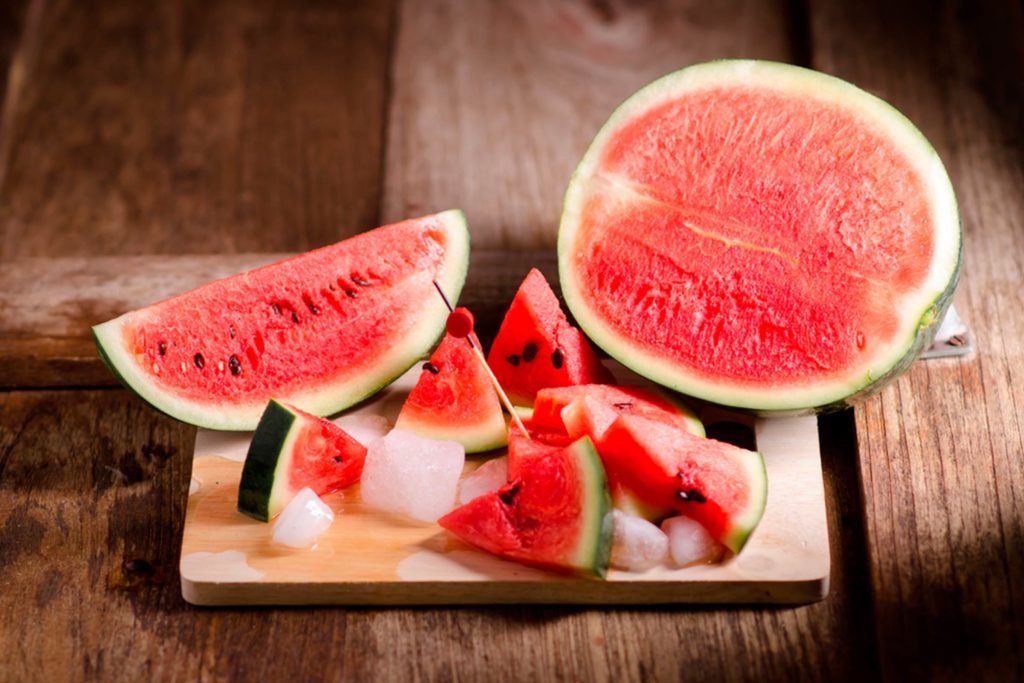Health Benefits of Eating Watermelon
The benefits of watermelon are not just limited to weight loss. Its low calorie content and high electrolyte content make it a great source of nutrition. Plus, its 92 percent water content means you will feel full without consuming too many calories. So, if you are looking for a healthy snack, consider trying this fruit out! It can be an excellent source of vitamin C and can even be used as a diuretic!
Carotenoids
Watermelon contains many carotenoids that give it its distinct flesh color. These micronutrients also play an important role in watermelon breeding. The presence of carotenoids in watermelon should become a prominent area of research in the future. This study evaluated the carotenoids content of five flesh-colored cultivars and used HPLC to identify individual pigment bands. The results indicated that the concentration of lycopene and beta carotene was highest in flesh-colored fruit.
The pigmentation of tomato and watermelon flesh differs significantly during the ripening process. The tomato is climacteric, while the watermelon is nonclimacteric. In unripe tomatoes, the mesocarp is green, primarily due to chlorophylls. In contrast, young watermelon fruit mesocarp is white with traces of carotenoids. Therefore, understanding how watermelon pigments are produced is fundamental for targeted breeding.
To understand the molecular basis of the accumulation of carotenoids in watermelon, comparative transcriptomics was performed on five cultivated watermelons with orange and red flesh. The researchers used GO terms and cluster analysis to identify gene-related cis-regulatory modules and hub genes that regulate the accumulation of carotenoids. A gene called Cla018406 may be responsible for b-carotene accumulation in watermelon. It is also a dnaJ-like protein, which may contribute to carotenoid accumulation in fruit. カマグラ ゴールド 通販 boosts the immune system and keeps you healthy and prevents infection.
Lycopene
The crystals in watermelon are rich in lycopene, a powerful antioxidant. The crystals are found in small globules throughout the fruit. They are found in the thylakoid membrane, where they are converted to an all-trans form by the carotenoid isomerase enzyme. Lycopene is a valuable component of a balanced diet.
Researchers have linked the high levels of lycopene in watermelon to improved heart health and bone health. The phytonutrient is also believed to have anti-inflammatory properties. It is best to eat watermelon when it is fully ripe for maximum lycopene content. Watermelon also contains beta-carotene, another powerful antioxidant. It helps boost immunity and fights against various types of cancer.
Studies on the role of lycopene in the prevention of cancer have found that yellow orange flesh contains less lycopene than yellow. According to a recent study by Choudhary et al., tomato lycopene content is significantly higher after heat treatment than orange or yellow flesh. This is because the tomato protein-carotenoid complex undergoes a higher level of conversion during heat treatment. By contrast, watermelon lycopene is directly available to the human body after consumption.
Magnesium
There are a variety of health benefits from eating watermelon, and a diet rich in watermelon can help prevent cardiovascular disease, cancer, and diabetes. Watermelon seeds, in particular, are a rich source of magnesium. Just one cup of these seeds provides 140% of your daily requirement. In addition to magnesium, watermelon seeds also contain potassium, copper, and manganese. These nutrients help the body regulate blood pressure.
Watermelon juice also contains L-citrulline, an antioxidant and an anti-inflammatory. It also helps to lower blood pressure by relaxing blood vessels, allowing more oxygen to circulate through the body. It also contains zinc, which is important for maintaining cardiovascular health and helping to regulate calcium movement in the heart. Despite its many benefits, watermelon juice also has some downsides. Excessive consumption of watermelon juice can result in a number of cardiovascular issues, due to its high potassium content. Additionally, excessive intake of watermelon juice can cause rapid drops in blood pressure.
In addition to potassium and magnesium, watermelon also contains significant amounts of vitamin C. These antioxidants are beneficial for lowering cholesterol and may even reduce the effects of Asthma. Because watermelon is high in water content, frequent urination is promoted, which flushes toxins and supports healthy aging. A high magnesium intake can help prevent a range of age-related diseases.
Diuretic action
Watermelon is widely used as a diuretic for its diuretic action. Various types of diuretic drugs can help you excrete excess water and salt from your body. They are beneficial for high blood pressure, kidney problems, and other illnesses. A recent study found that watermelon’s diuretic action is as strong as that of the common prescription drug furosemide. However, watermelon is not for everyone. Some people should consult with their doctor before discontinuing use of a prescription diuretic.
Watermelon contains fibre and water, and is rich in lycopene, a powerful antioxidant with anticarcinogenic properties. Watermelon season starts in late July and continues through late September. While the fruit is generally considered safe to eat for two kilograms, you should avoid eating more than this. Watermelon also contains a lot of potassium, magnesium, and thiazide, which can help reduce cholesterol levels.
In addition to its diuretic action, watermelon also contains vitamins and minerals that can help fight off diseases. Vitamin B6 helps form RBCs and antibodies that help the immune system fight off infection. This fruit also contains many nutrients that can help prevent liver disease. Further, watermelon’s high concentration of lycopene helps lower the risk of several diseases. In addition, watermelon has high levels of electrolytes, which may prevent heat stroke. Try it today. Improve health with セルノスジェル.
Lowers risk of cancer
A recent study suggests that drinking watermelon juice can lower your risk of developing breast cancer. The fruit contains the highest concentration of lycopene, a natural compound that triggers healthy reactions in the body. Lycopene is responsible for giving tomatoes, watermelons, red grapefruits and guavas their bright red colour. Scientists have noticed this and are now examining its benefits.
The antioxidants that are abundant in watermelon include lycopene, which protects cells from damage and may reduce the risk of prostate cancer. Its anti-inflammatory and antioxidant properties are also important for overall health. Watermelons contain high amounts of lycopene, so make sure to buy ripe watermelons. Additionally, watermelon contains beta-carotene, another antioxidant found in red and orange fruits. While all parts of the fruit are good for you, the white flesh closest to the rind has the highest amount of lycopene.
Watermelon is also high in lycopene, a substance that protects plants from the sun. It may help shield our skin from sun damage and reduce our risk of cancer. It is still important to use broad-spectrum sunscreen while outdoors. The antioxidants in watermelon may protect our skin from sun damage, but they do reduce our risk of cancer by lowering our overall risk. It is recommended that you choose seedless melon for this purpose, but do not be alarmed if you can’t find one.
Lowers risk of periodontal disease
Higher education reduces your risk of periodontal disease. According to the Department of Health Education and Welfare, men with a 40-inch waist are 19% more likely to develop periodontal disease than those who have a shorter waist. There are other risk factors that may be at play. Eating less red meat and sugary drinks can increase your risk of developing periodontal disease. Several factors have been linked to periodontal disease, including smoking and low-fat diets.
People with periodontal disease have an increased risk of major cardiovascular events, including heart attacks and strokes. Harvard University scientists studied 304 individuals to determine if periodontal inflammation could predict future risk of cardiovascular events. Inflammation of the gums could be an early indicator of future cardiovascular events, especially since the disease can lead to inflammation of the blood vessels. However, other risk factors had to be controlled. It’s important to maintain good oral hygiene to prevent periodontal disease.
Tobacco use is linked to numerous illnesses, including lung and heart diseases. Tobacco users are at increased risk of periodontal disease. People who are genetically predisposed to the disease may be less likely to practice diligent at-home oral care. While smoking is not a good option for everyone, it’s one way to prevent periodontal disease and improve overall health. If you’ve been avoiding tobacco, you’ll lower your risk of periodontal disease.
Reduces inflammation
A new study suggests that a diet rich in watermelon can reduce the inflammation of the body. The study, which enrolled participants with an average E-DII score of 58, was designed to evaluate the impact of watermelon on dietary inflammatory potential. Researchers adapted the Inflammation Management Intervention (IMAGINE) to include watermelon as an important dietary component and measured changes in body habitus, metabolic markers, and inflammatory markers after a three-month intervention. The study included a self-selection study in which participants participated in weekly in-person classes and a 12-week online program with basic health education via blogs. The participants completed baseline assessments, including anthropometrics and diet, and blood was drawn immediately postintervention. The researchers performed a post-hoc analysis of the results to determine whether watermelon reduces inflammation.
Although watermelon contains 92% water, it can reduce your risk of heart disease by decreasing the amount of oxidative stress in your body. A recent study found that watermelon reduced inflammation when consumed by overweight adults. Other benefits include its ability to reduce blood pressure and inflammation, and can reduce risk factors for obesity, diabetes, and metabolic syndrome. However, watermelon may not be suitable for everyone, and it should not be consumed in excess.

